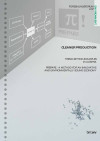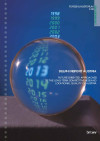Suchergebnisse
Cleaner Production

Trend-setting examples in Austria PREPARE a method for an innovative and environmentally sound economy
Forschungsforum
4/1997
Herausgeber: BMVIT
Englisch, 6 Seiten
Downloads zur Publikation
Transition to sustainable production systems
The project aims to provide the basis for a transition strategy towards the establishment of sustainability-orientated production and consumption systems. Together with participants and addressees of the programme "Factory of the Future", the project will develop a common framework for the management of transition processes.
EASEY Online Rating Preparation Transfer
Transfer of conceptual knowledge about rating of sustainability performance of SMEs to three different groups of consultants dealing with financial data. Sustainability in business, that is the thesis, contributes significantly to an increasing repay capability.
Material utilization of end-of-term textiles
Mechanical processing of the non-reusable part of collected end-of-life apparels (e.g. cutting, sifting, etc.); development of marketable application for the obtained short fibers in the field of construction materials (e.g. bitumen modification)
Delphi Report Austria

Future-oriented approaches to the long-term comptitiveness an locational quality of Austria
Forschungsforum
4/1998
Herausgeber: BMVIT
Englisch, 6 Seiten
Downloads zur Publikation
Secondary Materials in the Austrian Textile Industry - Study with Recommendations for the Austrian R&D-Politics
This study deals with the challenges and potentials for the use of secondary materials in the Austrian textile industry. It identifies challenges and potentials for establishing cycles in the textile industry with a focus on the use of secondary materials in Austria based on broad stakeholder involvement. Based on this, recommendations for research and development activities were formulated to promote recycling.
Sustainability Balanced Scorecard
The method Balanced Scorecard was used to build a company-wide management-system which facilitates an easy communication and a focused and controllable implementation of the defined strategies (strategies for the company, business segments and defined areas of knowledge). The aspect of sustainability was strongly emphasized.
EASEY - Ecological And Social EfficiencY
Developing an integrative concept for the evaluation of sustainability achievements of enterprises noted at Vienna's stock exchange.
Contracting Platform for SME´s
Evaluation of requirements and framework conditions for the implementation and the operation of a Contracting Platform for SME´s in Austria for the cost efficient identification and realisation of energy efficiency measures.
The Paper Factory in the Year 2030
Paper factory in the year 2030 as an integrated part of a sustainable economy and a supplier of sustainable paper products fulfilling criteria for sustainability at highest possible level.
ZERIA 3 (Zero Emissions Research in Application)
Elaboration of the principles for zero emission enterprises. The results show that this approach can be realistic and economically advantageous in many cases.
S I P settlement models in passive house quality
Research, development and realization of integral building concepts in passive house quality!
Urban Future - "Resource Efficient City of Tomorrow"
Challenges fort he cities of tomorrow with research issues referring to resource management, efficiency and technology development
Improvement of resource efficient use of wood
Modelling of wood processing in order to demonstrate the developments' impacts on performance
RAINBOW 2
Application and expansion of knowledge gained in the project Rainbow1 for the production of new, functionalised fibres using renewable resources as well as other fibre manufacturing methods in a pilot plant scale production.
TRIGOS - CSR pays!
The project analysed selected TRIGOS projects and organisations and further developed assessment approaches for sustainable management accounting and corporate social responsibility. TRIGOS is an award scheme for organisations who combine economic performance with social and environmental responsibility.
PolyBacTex - Converting mixed textile waste into recycled fibres and cellulose for sustainable production
The project PolyBacTex is developing a solution for recycling of used mixed textiles by chemically separating and biotechnologically upgrading the individual fibre types (cellulose and polyester). This allows cellulose fibres to be recovered and returned to the fibre production process.
Scenarios for the Biobased Industry in Austria
In order to support the implementation of the Austrian Bioeconomy Strategy, three scenarios for the bio-based industry in Austria were developed. The present study is intended to serve as a solid overview and as a starting point for further detailed studies by other researchers.
StraTex ‐ Sorting and processing strategies for used textiles to produce recyclable fractions
In StraTex, suitable, economically viable and holistic strategies for the collection, processing and automated sorting of mixed non‐reusable textiles are being developed and experimentally implemented in order to increase the proportion of marketable fractions for high‐quality material recycling (preferably fibre2fibre).
Repair initiatives in Europe: innovations, business models, recommendations. Experiences from the PREPARE network
The European Union and many countries in Europe have begun to take individual measures to-wards “increasing the repair rate” here and there. With the help of surveys and interviews, which were carried out with the support of contacts provided by the “PREPARE” network, which has ex-isted for almost 30 years, this work collects information about such measures in other European countries - especially regarding “best practice examples” and “lessons learned” – and analyzes their transferability to Austria.
